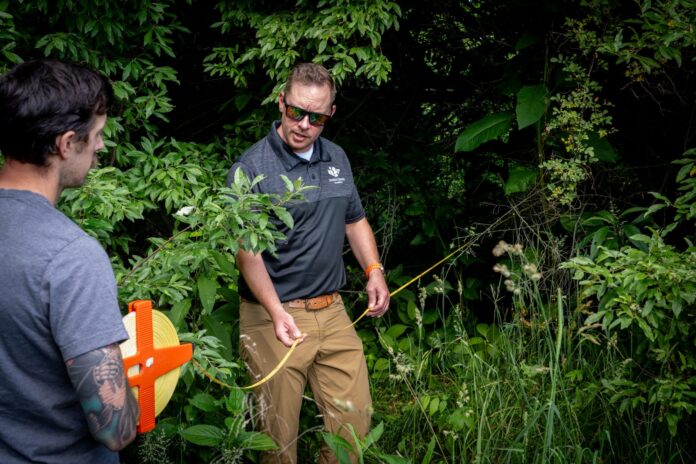Jacob Barney, professor of invasive plant ecology in the College of Agriculture and Life Sciences, has been appointed by the U.S. Department of the Interior’s Office of the Secretary to serve a two-year term on the Invasive Species Advisory Committee.
“It is an incredible honor to serve on the Invasive Species Advisory Committee and contribute to national discussions on how to address the complex challenges posed by invasive species,” Barney said. “This opportunity reflects the dedication and expertise of the Invasive Species Collaborative at Virginia Tech and underscores the importance of our work in safeguarding ecosystems.”
The Invasive Species Advisory Committee, established to provide guidance to the federal government via the National Invasive Species Council, plays a vital role in shaping policies and strategies to manage invasive species — a pressing issue with significant ecological, economic, and social implications. Barney’s inclusion on this committee is a recognition of his extensive knowledge of invasive species, their management, and policy developed through decades of research, teaching, and leadership in the field.
This prestigious appointment highlights Barney’s exceptional expertise and contributions to the field of invasive species research and management as well as Virginia Tech’s growing influence in addressing critical ecological challenges on a national level. He has published more than 100 peer-reviewed papers in top journals, given nearly 200 presentations at a range of venues, and secured more than $11 million in research funding on a wide range of invasive species issues. Barney was also a contributing author to the first global synthesis on invasive species published by the Intergovernmental Science-Policy Platform on Biodiversity and Ecosystem Services in 2023.
Barney’s research centers on the causes, consequences, epidemiology, and management of invasive plant species. His work has spanned a diverse range of systems and contexts, from investigating the invasive potential of bioenergy crops to studying the genetic and evolutionary dynamics of Johnsongrass, a widespread and expanding invader. In addition to conducting long-term management projects that assess the feasibility, economic impact, and non-target effects of eradication efforts, Barney’s lab is at the forefront of exploring innovative solutions to mitigate the impact of invasive species.
Barney’s academic journey includes a Ph.D. and master’s degree in horticulture from Cornell University and a bachelor’s degree in chemistry from the University of Kentucky.
Since joining Virginia Tech in 2010, he has made significant contributions as a researcher, educator, and leader. He is the recipient of numerous accolades, including the Early Career Weed Scientist Award from the Weed Science Society of America and the Outstanding Researcher and Educator Awards from the Northeastern Weed Science Society. Barney also directs the Invasive Species Collaborative, a multidisciplinary group at Virginia Tech focused on tackling non-native species through research, education, and outreach. It was recently awarded university-level funding supporting their work to address this global crisis, including the hiring of seven new tenure-track faculty positions across four colleges.
Beyond his research, Barney’s passion for teaching and mentoring has left a lasting impact on students. He has developed and taught courses such as Weeds That Shape Our World and Biological Invasions, fostering a deeper understanding of invasive species among the next generation of scientists.
As a member of the Invasive Species Advisory Committee, Barney will collaborate with experts from across the country to provide strategic guidance on invasive species management, ensuring that federal policies are informed by cutting-edge science. His appointment not only elevates Virginia Tech’s reputation but also reinforces its commitment to addressing critical environmental issues through impactful research and leadership.
“Jacob Barney’s appointment is a testament to his outstanding contributions to invasive species research and his ability to translate scientific discoveries into actionable policies,” said Benjamin Tracy, interim director at the School of Plant and Environmental Sciences. “This recognition also brings national attention to the innovative work being conducted at the School of Plant and Environmental Sciences.”
— By Tyler Bauguess

